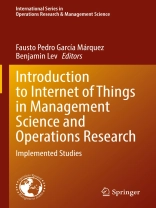This book aims to provide relevant theoretical frameworks and the latest empirical research findings in Internet of Things (Io T) in Management Science and Operations Research. It starts with basic concept and present cases, applications, theory, and potential future. The contributed chapters to the book cover wide array of topics as space permits. Examples are from smart industry; city; transportation; home and smart devices. They present future applications, trends, and potential future of this new discipline. Specifically, this book provides an interface between the main disciplines of engineering/technology and the organizational, administrative, and planning capabilities of managing Io T.
This book deals with the implementation of latest Io T research findings in practice at the global economy level, at networks and organizations, at teams and work groups and, finally, Io T at the level of players in the networked environments.
This book is intended for professionals in the field of engineering, information science, mathematics, economics, and researchers who wish to develop new skills in Io T, or who employ the Io T discipline as part of their work. It will improve their understanding of the strategic role of Io T at various levels of the information and knowledge organization. The book is complemented by a second volume of the same editors with practical cases.
สารบัญ
Chapter 1. Prescriptive Analytics in Internet of Things With Concentration on Deep Learning.- Chapter 2. Internet of Things: Technologies & Applications.- Chapter 3. Internet of Things Cybersecurity .- Blockchain as First Securitisation Layer of an IOT Network.- Chapter 4. Using Other Multi-Attribute Decision Making Techniques to Measure Efficiency When Data Envelopment Analysis Fails.- Chapter 5. A Data-Driven Traffic Responsive Signal Control for a Smart City Road Network Under Uncertainty.- Chapter 6. A Hybrid Model of Learning Methodology Analyzed Through the Use of Machine Learning Techniques.- Chapter 7. IOT Security and New Trends of Solutions.- Chapter 8. Application of Internet of Things (Iot) to Demand-Side Management in Smart Grids.- Chapter 9. Development Path, Experience and Implications of the Internet of Things Industry in Wuxi, Jiangsu Province, China.- Chapter 10. Understanding the Factors Influencing Consumers’ Behaviour Towards Autonomous Vehicles Adoption.- Chapter11. Utilization of Consumer Appliances in Smart Grid Services for Coordination With Renewable Energy Sources.- Chapter 12. Use of Convolutional Neural Networks for Quality Control in Automotive Industry.
เกี่ยวกับผู้แต่ง
Fausto Pedro García Márquez is a professor at UCLM, Spain. He has published more than 150 papers, he is Editor of 5 International Journals, Committee Member of more than 40 International Conferences. His main interests are: Artificial Intelligence, Maintenance, Management, Renewable Energy, Transport, Advanced Analytics, Data Science. He is Director of www.ingeniumgroup.eu Benjamin Lev is the University Trustee Professor at Le Bow College of Business, Drexel University, Philadelphia, Pennsylvania, USA. He has published sixteen books and is the Editor-in-Chief of OMEGA-The International journal of Management Science; Co-Editor-in-Chief of
International Journal of Management Science and Engineering Management; and serves on several other journal editorial boards (INFORMS JAA (formerly Interfaces), IAOR, ORPJ, Financial Innovation, OPSEARCH, IDIM, IIE-Transactions, ERRJ, INFORMS JOR).












